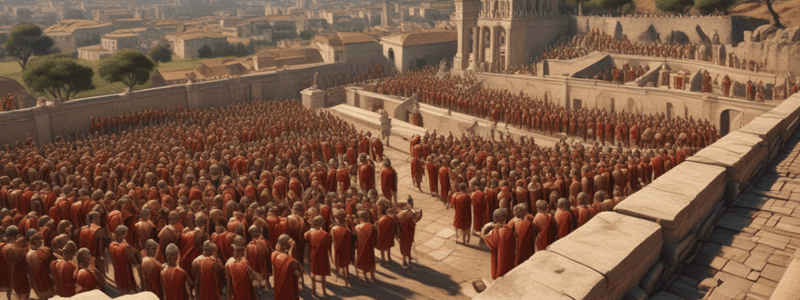Podcast
Questions and Answers
What initial view did the Roman authorities have toward Christianity in the Roman Empire?
What initial view did the Roman authorities have toward Christianity in the Roman Empire?
Who played a significant role in spreading the teachings of Jesus across the Roman Empire?
Who played a significant role in spreading the teachings of Jesus across the Roman Empire?
During which emperor's reign did early Christians face persecution following the Great Fire of Rome in 64 CE?
During which emperor's reign did early Christians face persecution following the Great Fire of Rome in 64 CE?
What factor contributed significantly to the rapid growth of Christianity amidst urban life challenges?
What factor contributed significantly to the rapid growth of Christianity amidst urban life challenges?
Signup and view all the answers
How did the relationship between the Christian church and the Roman imperial government evolve over time?
How did the relationship between the Christian church and the Roman imperial government evolve over time?
Signup and view all the answers
What was the significance of the Edict of Milan issued by Constantine the Great?
What was the significance of the Edict of Milan issued by Constantine the Great?
Signup and view all the answers
How did the conversion of Constantine the Great impact the relationship between Christianity and the Roman Empire?
How did the conversion of Constantine the Great impact the relationship between Christianity and the Roman Empire?
Signup and view all the answers
What did Jesus emphasize in his teachings?
What did Jesus emphasize in his teachings?
Signup and view all the answers
What event marked a turning point for Christianity in the Roman Empire?
What event marked a turning point for Christianity in the Roman Empire?
Signup and view all the answers
What is the primary text of Christian doctrine and practice?
What is the primary text of Christian doctrine and practice?
Signup and view all the answers
How did the early Christians initially face challenges in spreading their faith?
How did the early Christians initially face challenges in spreading their faith?
Signup and view all the answers
What event led to Constantine's support for Christianity?
What event led to Constantine's support for Christianity?
Signup and view all the answers
What part of the Bible contains letters attributed to Jesus' early followers?
What part of the Bible contains letters attributed to Jesus' early followers?
Signup and view all the answers
Which emperor played a significant role in promoting Christianity within the Roman Empire?
Which emperor played a significant role in promoting Christianity within the Roman Empire?
Signup and view all the answers
What event led to Constantine ending state-sponsored persecution of Christians within the Roman Empire?
What event led to Constantine ending state-sponsored persecution of Christians within the Roman Empire?
Signup and view all the answers
Study Notes
Christianity in the Roman Empire
In the first century CE, Christianity emerged as a religious movement in the Roman Empire. Initially, the Roman authorities viewed Christianity with suspicion due to its perceived connections to Judaism and its rejection of traditional Roman religious practices. However, over time, Christianity evolved and adopted aspects of Roman culture, leading to its gradual acceptance and, ultimately, its transformation into the empire's dominant religion.
Spread of Christianity
The Roman Empire facilitated the spread of Christianity through its efficient infrastructure and communication networks. The teachings of Jesus reached Jewish communities across the empire, thanks in part to the energy of apostles like Paul. Paul traveled extensively throughout the empire, preaching in major cities and reaching diverse audiences. His message emphasized the importance of eternal life, resonating with those who sought spiritual comfort amid the harsh realities of urban life.
Paul also introduced the concept of accepting non-Jewish converts, which allowed the movement to expand beyond its Jewish roots. This relaxation of earlier Jewish laws regarding food and circumcision helped to create a broader appeal and contributed to the rapid growth of Christianity.
Persecution of Christians
Early Christians faced persecution during the reign of Emperor Nero following the Great Fire of Rome in 64 CE. Nero accused Christians of setting the fire and used the opportunity to divert attention from his own responsibility for the disaster. Christians were arrested, tortured, and executed in gruesome displays of public punishment, causing fear among the population and reinforcing negative views of the emerging faith.
However, Nero's campaign against Christians was relatively short-lived, and subsequent emperors took a more lenient stance towards the religion. Under Emperor Trajan, Christians were simply punished if they failed to renounce their beliefs upon criticism. Over time, the Christian church and faith became more organized, reflecting the structure of the Roman imperial government.
Acceptance of Christianity
Constantine the Great played a pivotal role in the acceptance of Christianity by the Roman Empire. In 313 CE, he issued the Edict of Milan, granting the religion legal status alongside other religions. Ten years later, in 323 CE, Christianity officially replaced polytheism as the empire's religion.
While the conversion of Constantine has been interpreted in various ways, his actions marked a turning point in the history of Christianity in the Roman Empire. Under his rule, the alignment of Christ and the emperor as spiritual leaders became institutionalized, shaping the relationship between religion and power for generations to come.
Studying That Suits You
Use AI to generate personalized quizzes and flashcards to suit your learning preferences.
Description
Test your knowledge on the emergence, spread, persecution, and acceptance of Christianity within the Roman Empire. Explore key historical events, figures, and the transformation of Christianity into the dominant religion of the empire.




